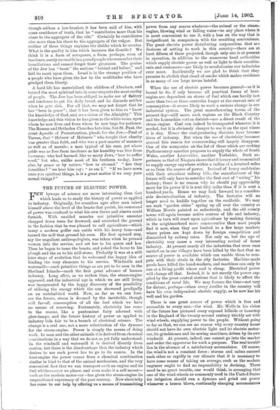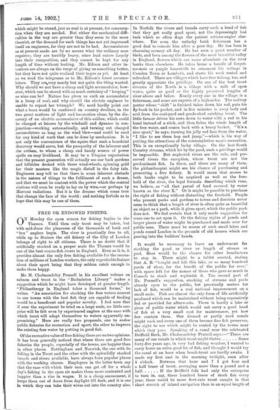THE FUTURE OF ELECTRIC POWER.
FEW byways of science are more interesting than that which leads us to study the history of power as applied to industry. Originally, for countless ages after man raised himself above the level of the beasts that perish, his command of power was confined to what his own thews and sinews could furnish. With unaided muscles our primitive ancestor chopped down trees for firewood, and scratched the ground in the fashion that he was pleased to call agriculture—which many a modern golfer can outdo with his heavy iron—and turned the mill that ground his corn. His first upward step, say the ungallant anthropologists, was taken when he pressed woman into the service, and set her to his quern and hoe. Then he began to tame the beasts, and yoked the horse to his plough and the ox to his mill-stone. Probably it was at a still later stage of evolution that he welcomed the happy idea of binding the very elements to his service. Windmills and watermills—such primitive things as are yet to be seen in the Shetland Islands—mark the first great advance of human industry. Long after, as we reckon time, the steam-engine appeared, and the industrial age in which we are still living was inaugurated by the happy discovery of the possibility of utilising the energy which the sun showered prodigally on an uninhabited world. Now, as far as we can fore- see the future, steam is doomed by the inevitable, though still far-off, consumption of all the fuel which we have no means of renewing. Fortunately, electricity has come to the rescue, like a pantomime fairy adorned with glow-lamps, and the future history of power as applied to industry bids fair to be a branch of electrical science. The change is a real one, not a mere substitution of the dynamo for the steam-engine. Power is simply the means of doing work. In man and the other animals it is derived from chemical combinations in a way that we do not as yet fully understand. In the windmill and watermill it is derived directly from motion, but there is the disadvantage that the industry which desires to use such power has to go to its source. In the beat-engine the power comes from a chemical combination similar in kind to that of the animal mechanism, and the very convenient fact that we can transport such an engine and its fuel whithersoever we please, and even make it a self-mover- such as the modern motor-car—has given the steam-engine its unquestioned supremacy of the past century. Now electricity has come to our help by offering us a means of transmitting
power from any source whatever—the animal or the steam. engine, blowing wind or falling water—to any place where it is most convenient to use it, with a loss on the way that is insignificant in comparison with the resulting convenience. The great electric power distributing corporations that ara desirous of setting to work in this country—there are at least fifteen of these projected, though only one is at present in operation, in addition to the numerous local authorities which supply electric power as well as light to their constitu- ents and customers—are likely to revolutionise our industries once more. Incidentally we are glad to think that they promise to abolish that cloud of smoke which makes residence in so Many of our large towns hateful.
When the use of electric power becomes general—as it is bound to do, if only because all practical forms of heat- engine are dependent on stores of fuel which can hardly last more than two or three centuries longer at the current rate of consumption—it seems likely to work a curious change in our industrial system. The great manufacturing towns of the present day—still more, such regions as the Black Country and the Lancashire cotton district—are a direct result of the steam engine. Coal can indeed be transported wherever it is needed, but it is obviously cheaper to use it on the spot where it is dug. Hence the coal-producing districts have become hives of industry. But when the use of electricity becomes general this reason for overcrowding will largely disappear. One of the companies on the list of those which are seeking Parliamentary sanction proposes to supply the whole of South Wales, another Lancashire, another Yorkshire. Such ex- perience as that of Niagara shows that it is easy and economical to supply energy anywhere within a radius of a hundred miles or so from the source of power. Instead of heavy coal-trains with their attendant railway bills, the manufacturer of the future will only have to consider the first cost of " wiring " his factory; there is no reason why he should pay appreciably more for his power if it is sent fifty miles than if it is sent a hundred yards. Hence we may look forward to a consider- able decentralisation of industry. The factories will no longer need to huddle together on the coalfields. We may see such "garden cities" spring up all over the country as William Morris painted so seductively, and the old county towns will again become active centres of life and industry, which in turn will react upon agriculture by making farming in the neighbourhood more remunerative than most people find it now, when they are limited to a few large markets where prices are kept down by foreign competition and diminished by railway rates. Not only so, but the' age of electricity may cause a very interesting revival of home industry. At present nearly all the industries that were once carried on in our villages have been killed by the fact that no source of power is available which can enable them to com- pete with their rivals in the city factories. Machine-made goods have killed the hand-workers, and machines can only be run at a living profit where coal is cheap. Electrical power will change all that. Indeed, it is not merely the power sup- plied by the great central stations that is likely to affect the conditions of rural life. We may foresee the time—not very far distant, perhaps—when every dweller in the country will have his own independent electric supply, as he now has his well and his garden.
There is one great source of power which is free and accessible to every one,—the wind. Mr. Wells in his vision of the future has pictured every exposed hillside or housetop in the England of the twenty-second century thickly set with wind-wheels, supplying power to the people. Without going so far as that, we can see no reason why every country house should not have its own electric light and its electric motor- car, its grindstones and its sewing machines, driven by its own windmill. At present, indeed, one cannot go into the market and order the apparatus for such a purpose. The real trouble lies in the absence of a satisfactory accumulator. Of course, the wind is not a constant force : storms and calms succeed each other so rapidly in our climate that it is necessary to have some means of taking an average, such as the modern engineer ought to find no impossibility in devising. There need be no great trouble, one would think, in arranging that one of the wind-wheels so commonly used in the United States for irrigation should run a dynamo and grind out power whenever a breeze blows, continually charging accumulators which might be stored, just as coal is at present, for consump- tion when they are needed. But either the mechanical diffi- culties in the way are greater than they seem to the mere theorist, or the demand for such things has not yet impressed itself on engineers, for they are not to be had. Accumulators as at present made are by no means what the ordinary man requires ; they are terribly heavy, since lead enters largely into their composition, and they cannot be kept for any length of time without leaking. Mr. Edison and other in- ventors are always on the verge of giving us something better, but they have not quite realised their hopes as yet. At least so we read the telegrams as to Mr. Edison's latest accumu- lators. They arvery nearly but not quite the thing wanted. Why should we not have a cheap and light accumulator, how- ever, which can be stored with as much certainty of "keeping" as wine can be? Nature has given us such an accumulator in a lump of coal, and why should the electric engineer be unable to repeat her triumph ? We need hardly point out what a boon would be conferred on country dwellers, in the two great matters of light and locomotion alone, by the dis- covery of an electric accumulator of this calibre, which could be charged at leisure by the windmill and dynamo in con- junction—working automatically, and turning out charged accumulators as long as the wind blew—and could be used for any kind of work that can be done by mechanism. It is not only the convenience of the squire that such a beneficial discovery would serve, but the prosperity of the labourer and the artisan, to whom a cheap and handy source of power spells an easy livelihood. It may be a Utopian expectation that the present generation will actually see our back gardens and hillsides decked with these wind-wheels, spinning gold for their masters like the magic distaff in the fairy tale. Engineers may tell us that there is some inherent obstacle in the nature of things to the fulfilment of such a dream, and that we must be content with the power which the central stations will soon be ready to lay on by wire,—or perhaps by Marconi radiations. But it is the dreams which come true that change the face of the world; and nothing forbids us to hope that this may be one of them.











































 Previous page
Previous page